“Such an army would need to be subordinated to a common government”, says political analyst Olaf Bernárdez. Some evangelicals say more military is not the solution.
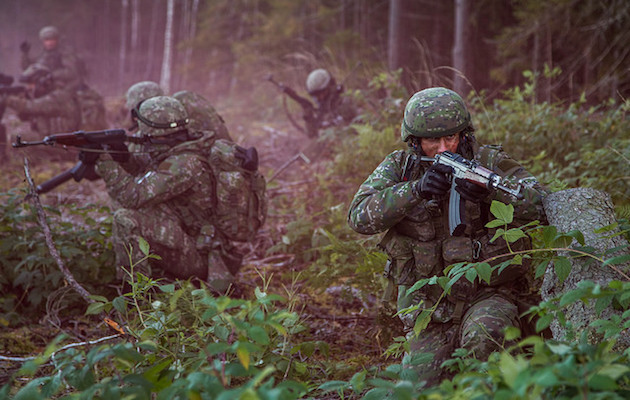 Slovakian soldiers during a manoeuvre in Latvia. / Nato Flickr
Slovakian soldiers during a manoeuvre in Latvia. / Nato Flickr
The diplomatic crisis between some of the member states and founders of the European Union has once again generated debate about the future of this supranational entity.
The United Kingdom has just come to an agreement to carry out the Brexit, the process to leave the organs of the continental union.
Italy, with its budget for 2019 blocked from Brussels, leads, along with Hungary, what could be a group of rebellious countries, especially in terms of migration policy.
Meanwhile, the president of France, Emanuel Macron, and the German chancellor, Angela Merkel, have started to talk about the idea of creating a joint continental army. The president of the European Parliament, Antonio Tajani, seconded the proposal.
EU ARMY AND NATO
“It's not a new idea. As early as 1954, an attempt was made to create a European Defense Community, but it did not materialize because of internal disagreements in France”, political analyst Olaf Bernárdez, told Spanish news website Protestante Digital.
According to Bernárdez, “it is an issue that evolves slowly, and it is one of the final aims of the EU. It has been included in the global strategy of the EU since 2016, with the aim of achieving strategic autonomy on the international scene”.
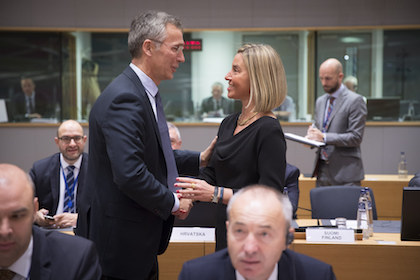 The NATO General Secretary, Jens Stoltenberg, and the High Representative of Foreign Policy of the EU, Federica Mogherini. / NATO Flickr
The NATO General Secretary, Jens Stoltenberg, and the High Representative of Foreign Policy of the EU, Federica Mogherini. / NATO FlickrMerkel, however, has emphasized that the proposal does not affect the NATO agreement, but complements it. “Nobody wants to throw away an alliance that has proven valuable”, said the German chancellor.
The High Representative of Foreign Policy of the EU, Federica Mogherini, who has had several meetings with different foreign and defense ministers this month, also stressed that “by strengthening European defense, we are strengthening in an unprecedented way our cooperation with NATO”.
QUESTION OF POWER
NATO observes these movements with suspicion. A commitment signed by its members in 2014, states that, within a period of ten years, everyone would be allocating at least 2% of the national GDP to Defense, and from the organization they now demand compliance.
Only the United Kingdom, Poland, Greece, Romania and Estonia have already fulfil this commitment.
In addition, the president of the United States, Donald Trump, announced that the US plan to increase military spending to 10% in 2019, as Russia continues to act to gain influence in the East of Europe.
All this generates a pressure fence, in which the European Union wants to have its own voice.
“The desire expressed by the two heads of the EU (France and Germany), seeks to give a political boost to a Europe affected by various situations, such as nationalist outbreaks in different countries of recent entry, several countries belonging to the former influence of the Soviet Union, and the special case of Italy”, Bernárdez points out.
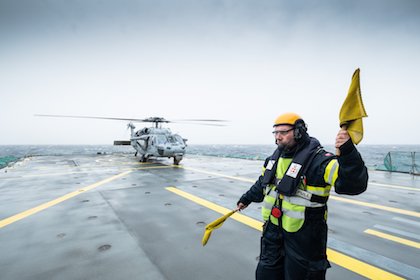 Manoeuvres in an aircraft carrier. / Nato Facebook
Manoeuvres in an aircraft carrier. / Nato Facebook
LOSING NATIONAL SOVEREIGNTY?
The increase of tensions with Italy since the formation of the new government, led by two Euro-skeptical parties, has to do with the limits of national sovereignty in the European Union.
The supranational entity has vetoed the Italian budgets for 2019, but Rome is willing to go ahead and disobey. The migration issue has become a frontal confrontation between Italy and some of its European partners, especially France and Germany.
“Before proceeding to the creation of a common European army, real steps must be taken to complete the process of political and economic union of the EU. It is vital to have, as in any democratic country, a common government to which that army is subordinated”, the political analyst said.
For Bernárdez, the creation of a joint armed force at continental level “would suppose a loss of the so prized national sovereignty”.
“That is why it is a slow process that must be based on a prior creation and consolidation of the political, economic and even fiscal project. An Armed Force without a strong and democratic executive that directs and controls them are not be seen for now”.
THE IDEA OF PEACE
The whole debate about a common European army has brought up what concept of peace the European Union and its institutions have.
“More than ever before we need the understanding that tolerance is the soul of Europe, that tolerance is a core part of who and what we are as Europeans and that only with tolerance we can develop the willingness to see the interests and needs of the other as our own”, Merkel said recently.
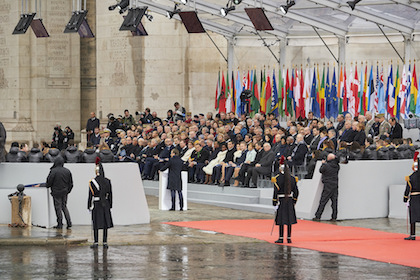 The French President, Emanuel Macron, in the commemoration of the armistice of the WWI. / NATO Flickr
The French President, Emanuel Macron, in the commemoration of the armistice of the WWI. / NATO FlickrAccording to Dionisio Byler, in consensus with leaders of the community of Anabaptists, Mennonites and Brothers of Christ in Spain (AmyHCE in Spanish), traditional defenders of nonviolence in Protestantism, the current situation is related to the aftermath of the great modern conflicts, such as World War II or the Cold War.
“The horrors of the Balkan wars are not that far away”, and “the same tribalism that destroyed the former Yugoslavia is making its way in different ways in our continent”.
“In almost all ages of humanity, war is a permanent reality, located in geographically limited conflicts”, he added. “Everyone fights with what they have available; a vest with explosives to immolate himself in a public square, or a remote-controlled drone from thousands of kilometers away, depending on the budget you have”.
A CULTURE OF FORGIVENESS
Byler points out that “the ideology of military discipline wants us to believe that an army at war does not have to become a huge crowd of predators, but reality is far away from that ideology and that discipline”.
“It is written in our DNA, if we disinhibit ourselves from killing our neighbor, all other moral restraints also fall”, he explains.
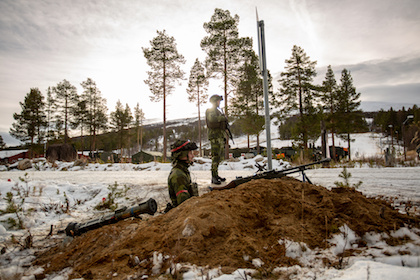 Swedish soldiers during a manoeuvre in Norway. / Nato Flickr
Swedish soldiers during a manoeuvre in Norway. / Nato FlickrThe culture of forgiveness is a previous step to a culture of peace, and the gospel, should be prioritised, according to these Protestant groups who are conscientious objectors and supporters of non-violent action.
They believe that “the first thing is to teach a culture of forgiveness, harmonious coexistence, refusing to feed resentments”.
“THE VALUES OF THE KINGDOM OF GOD”
“This pedagogy of starting with little things and with those closer to us, where it is more necessary to live the values of the kingdom of God, has its counterpart with the presentation of the values of the kingdom of God for the edification of many others, in other churches and traditions, who have never had the opportunity to consider the immensity of the biblical message in favor of harmonious and reconciled coexistence”, Byler says.
This should begins among Christians. “We will hardly have a persuasive message for the world that does not believe that God has power or disposition to defend those entrusted to him, when the church itself is full of people who also do not believe that God has that power”.
“We will have to bring the message of voluntary renunciation to defend ourselves by violent means to fellow Cristians. Jesus does not govern from above, by force, but from below, from the Cross”, he concludes.

Las opiniones vertidas por nuestros colaboradores se realizan a nivel personal, pudiendo coincidir o no con la postura de la dirección de Protestante Digital.
Si quieres comentar o